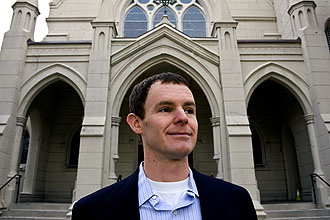Student Examines Antebellum History of Church, Slaves
Michael Goldston, a master of arts candidate in history, has conducted research that shows in the decade and a half before the Civil War, the Episcopal Diocese ministered to thousands of slaves on plantations in Louisiana.

Michael Goldston has written a history master's thesis about the ministry of the Episcopal Diocese of Louisiana on plantations before the Civil War. For his research, he used records in the archives of Christ Church Cathedral and the Howard-Tilton Memorial Library. (Photo by Paula Burch-Celentano)
African Americans were baptized, confirmed, married and buried by Protestant Episcopal ministers, often in the same buildings where white congregations also met.
But after the war, African Americans left the Episcopal Church almost en masse. They joined other Christian denominations such as Baptist, Methodist or African Methodist Episcopal.
As part of a national initiative, the Episcopal Diocese approached the Tulane history department to look into the church's interactions with slavery.
Goldston, a Navy pilot and Tulane Navy ROTC academic and aviation adviser, took on the research project and has written a master's thesis, using archival records of the Episcopal Diocese of Louisiana, which are housed in Jones Hall of the Howard-Tilton Memorial Library and at Christ Church Cathedral in New Orleans.
What Goldston has learned is that the number of African American slaves who joined the Episcopal Church peaked in 1858. Leonidas Polk, the Episcopal bishop, urged slaveholders to bring their slaves to church.
Polk preached, says Goldston, that it was "the duty of the masters to bring their slaves into the church and that by providing for the salvation of the slave, they were fulfilling their Christian duty."
The message for the slaves, however, was a message of servility, not liberation.
After the war, freed slaves were drawn to Protestant services that were more emotional than the more formal liturgy of the Episcopal Church, the church of the masters.
"But they didn't drop Christianity, in general," says Goldston. "Once they were free, freed men looked back on the church as a powerful institution for bringing a message of hope of salvation and hope of a better world into their lives."
